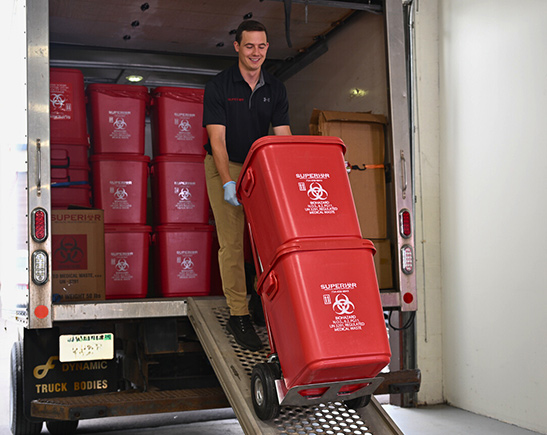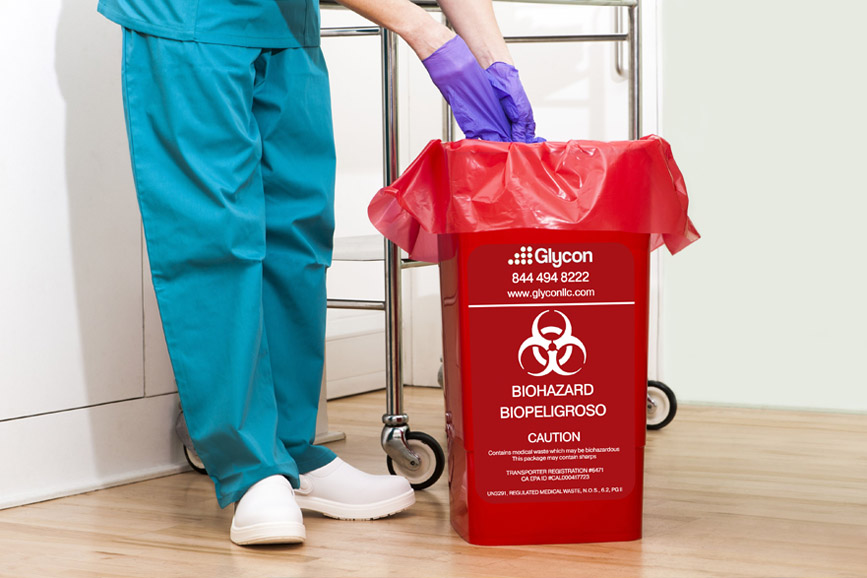Guardians of Tidiness: Local Medical Waste Removal Service for Your Comfort
Guardians of Tidiness: Local Medical Waste Removal Service for Your Comfort
Blog Article
Remain Ahead of Regulations: Expert Suggestions on Medical Garbage Disposal
In a world where the medical care sector is frequently progressing, it is imperative for clinical facilities to remain in advance of regulations when it comes to the appropriate disposal of clinical waste. From comprehending the different categories of medical waste to applying the right collection and partition methods, this discussion will certainly offer important insights and actionable tips to aid facilities remain in advance of laws in the ever-changing landscape of medical waste disposal.
Understanding Clinical Waste Categories
Recognizing medical waste categories is essential for proper disposal and management in healthcare centers. Medical waste describes any waste produced by medical care tasks that might present a hazard to public health or the environment. It is crucial to classify clinical waste precisely to ensure its risk-free handling, disposal, transport, and treatment.
There are a number of categories of medical waste that medical care facilities require to be knowledgeable about. The most typical groups consist of infectious waste, pathological waste, sharps waste, pharmaceutical waste, and chemical waste. Each group has certain standards and laws for its appropriate administration and disposal.
Pathological waste refers to human tissues, body organs, or body components that call for unique handling and disposal. Drug waste comprises run out, extra, or contaminated drugs that need mindful handling and disposal.
Remaining Up-To-Date With Regulatory Modifications
Staying present with regulatory modifications is crucial for healthcare centers to guarantee conformity and proper management of clinical garbage disposal. medical waste removal near me. With regulations constantly progressing, it is necessary for healthcare centers to stay current to prevent charges, penalties, and potential harm to the atmosphere and public health and wellness
To stay ahead of governing modifications, health care facilities need to develop a system for surveillance and monitoring updates. This can be done by subscribing to regulative newsletters, going to workshops and seminars, and proactively participating in industry organizations. Additionally, facilities ought to mark a personnel participant or team in charge of remaining informed and disseminating details to relevant stakeholders.
Routine interaction with governing agencies is also important. Health care facilities need to develop connections with neighborhood, state, and government companies to guarantee they know any kind of changes in regulations that might influence their waste monitoring techniques. This can be done with routine conferences, participation in public remark periods, and positive involvement with governing companies.
Moreover, medical care centers ought to take into consideration partnering with waste monitoring firms that focus on medical waste disposal (medical waste disposal services with WasteX). These business are usually fluent in the newest regulations and can offer support and support to guarantee conformity
Applying Appropriate Collection and Partition Techniques
To successfully manage clinical garbage disposal, health care facilities need to develop correct collection and partition techniques according to regulative guidelines. Executing these approaches makes sure the risk-free handling and disposal of potentially unsafe products, safeguards the setting, and reduces the threat of infections and injuries to health care workers and the basic public.
Proper collection and segregation methods involve using assigned containers and classifying systems. Health care facilities should supply clearly labeled containers for different sorts of medical waste, such as sharps, infectious waste, pharmaceutical waste, and non-hazardous waste. These containers ought to be color-coded and plainly significant to prevent confusion and advertise easy identification.
Additionally, healthcare facilities need to educate their personnel on the correct procedures for collecting and setting apart clinical waste. This consists of educating them on the different types of waste, the ideal containers to utilize, and the significance of complying with guidelines and guidelines. Routine training sessions and refresher courses must be carried out to ensure that personnel stay current on best techniques.
In addition, healthcare facilities must develop a system for regular collection and disposal of clinical waste. This might include partnering with certified waste administration business that concentrate on medical garbage disposal. These companies will make sure that the collected waste is transported and gotten rid of in conformity with governing requirements.
Selecting the Right Disposal Techniques

Incineration is among the most effective and common techniques for dealing with certain kinds of medical waste, such as pathological waste and sharps. It includes the regulated combustion of waste at high temperatures, decreasing it to ash. Nonetheless, incineration can launch damaging toxins into the air and add to air pollution.

Other disposal techniques consist of chemical treatment, microwave treatment, and landfilling. Chemical therapy involves the use of chemicals to neutralize the waste and decontaminate. Microwave treatment uses microwave power to warmth and decontaminate the waste. Landfilling involves hiding the waste in a designated landfill area (medical waste disposal services with WasteX). Nonetheless, landfilling should be the last resource because of the possible threat of contamination to dirt and groundwater.
Ensuring Compliance Via Documents and Training
After carefully taking into consideration the proper disposal techniques for clinical waste, health care centers must make sure compliance with regulations and minimize environmental influence by executing effective paperwork and training treatments. This step is critical in keeping a risk-free and sustainable setting for both health care employees and the public.

Medical care employees who manage medical waste must obtain suitable training on waste segregation, handling, and disposal procedures. By supplying extensive training, health care centers can encourage their team to make enlightened decisions and lessen the risk of incorrect waste disposal.
Final Thought
Finally, staying in advance of guidelines in clinical garbage disposal is vital for health care facilities. medical waste removal service. Recognizing the different classifications of clinical waste, staying upgraded with regulative modifications, executing appropriate collection and segregation techniques, picking the ideal disposal approaches, and making sure compliance through paperwork and training are all important steps. By medical waste disposal services with WasteX complying with these standards, healthcare organizations can efficiently dispose and take care of of medical waste in a liable and safe fashion
From recognizing the various classifications of medical waste to applying the right collection and partition techniques, this conversation will certainly supply workable ideas and beneficial insights to help facilities remain in advance of policies in the ever-changing landscape of clinical waste disposal. - medical waste disposal services with WasteX
The most typical groups consist of contagious waste, pathological waste, sharps waste, pharmaceutical waste, and chemical waste. Healthcare facilities try this website must offer plainly labeled containers for various kinds of clinical waste, such as sharps, infectious waste, pharmaceutical waste, and non-hazardous waste. Medical care facilities ought to develop an extensive system to tape-record and track all aspects of clinical waste disposal, consisting of types of waste generated, quantities, and disposal techniques made use of. Healthcare employees that manage clinical waste ought to obtain appropriate training on waste segregation, taking care of, and disposal procedures.
Report this page